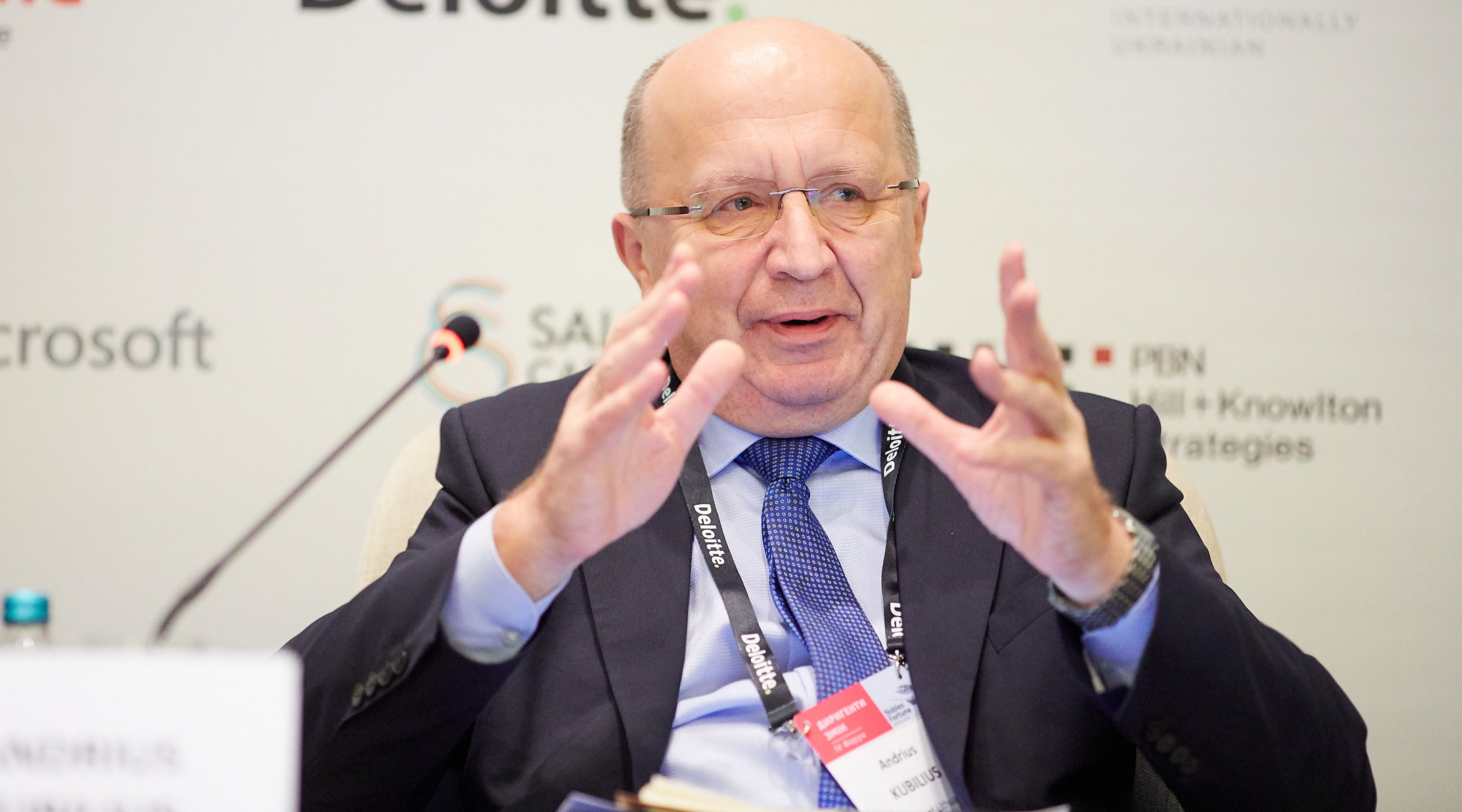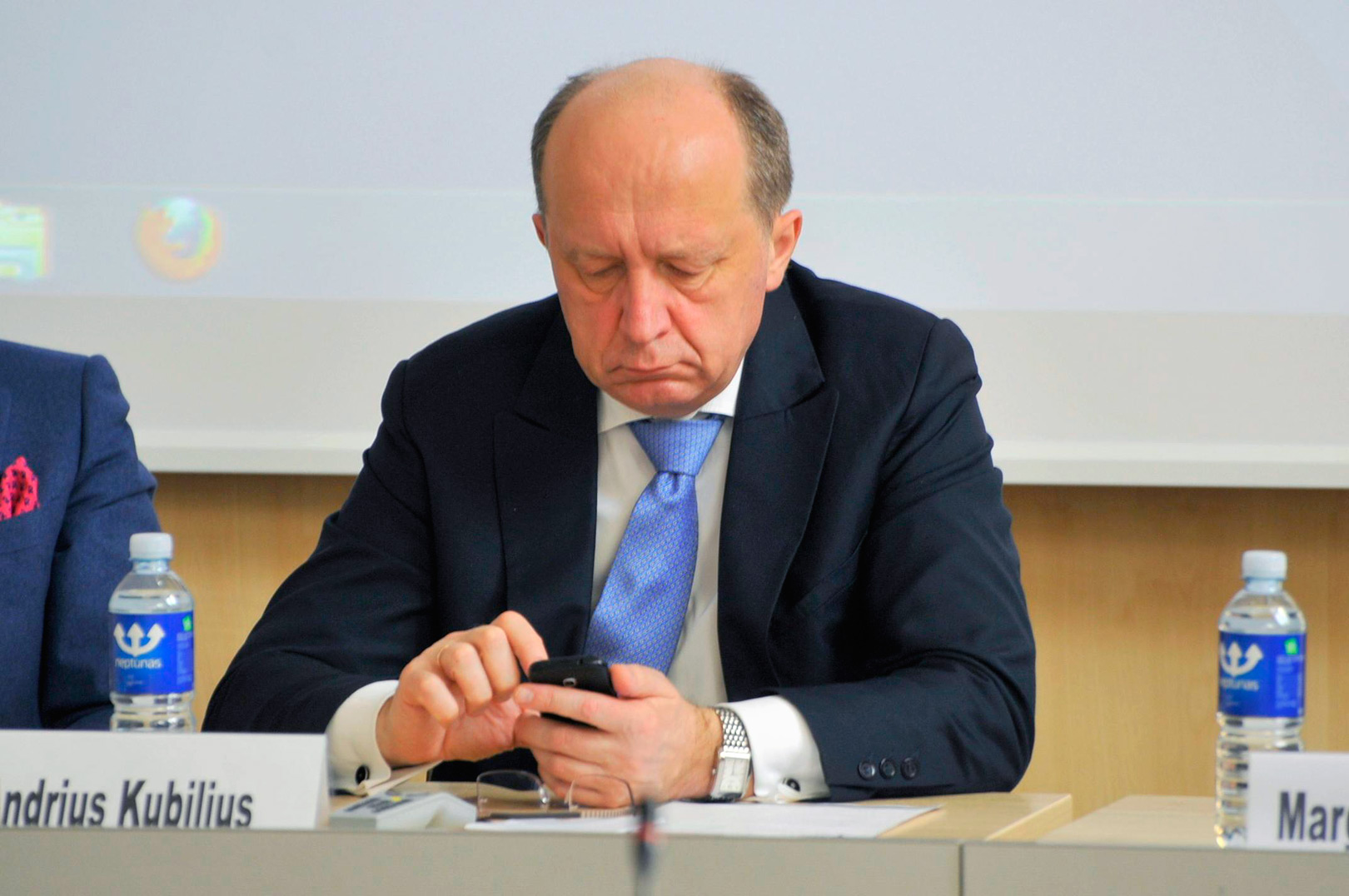Andrius Kubilius is one of the four candidates nominated by the governments to the post of Secretary General of the Council of Europe. It is a Lithuanian politician, former prime minister, and now deputy of the Sejm of Lithuania, who the Ukrainian delegation to the PACE supports in the election of a new head of the Council of Europe.
Kubilius initiated and co-sponsored the so-called Marshall Plan for Ukraine, which is aimed at attracting multibillion-dollar international investment for the sake of European development of the state and advancement of reforms.
The Lithuanian politician spoke in an exclusive interview with Ukrinform's correspondent in Strasbourg about his vision of the future of the Council of Europe, the West's strategy towards Russia, and prospects for Ukraine's membership of the EU.
Question: Mr Kubilius, you are a candidate for the post of Secretary General of the Council of Europe. The organization is now going through a period of crisis amid Russia's aspirations to undermine European values and use blackmail. What is your vision of the future of the Council of Europe in such difficult circumstances?
Answer: My understanding of the Council of Europe is very simple. This year, the organization will mark the 70th anniversary of its creation. We have to look at what the Council of Europe has achieved for these 70 years. But a lot has been done. We - Lithuania - are the product of its success. What the state has achieved over the past 30 years of independence was in many ways thanks to the Council of Europe. We have learned to develop democracy, establish human rights, the rule of law. And the Council of Europe was very helpful here. Moreover, the Council of Europe is the organization that helped us prepare for membership in the European Union. It was connected.
The organization has clear ambitions that were included in the Statute of the Council of Europe back in 1949. It is about uniting Europe around the values of human rights, democracy, the rule of law. And it is happening, but gradually. Lithuania has managed to join this association earlier. Ukraine is undergoing a longer transformation. Russia initially moved forward but now returns to a status where democracy was thrown into question.
Q: After all, does the Council of Europe have a future?
A: If we look at the next 70 years... Here I have a very simple vision. I have a personal goal. I may not live until 2089, when the 140th anniversary of the creation of the Council of Europe will be marked, but I imagine that we will live in a Lithuania more prosperous, democratic and surrounded by the same democratic states and neighbors. This will mean that the global security issue will be removed from the agenda. Because democracies are not fighting each other. But so far, this is a big problem in our region. And Ukraine knows this better than me.
So, the Council of Europe must have a very clear vision of its goal and ambition in order to establish the values of democracy and human rights in the wider area of the European continent.
There is something to think about, in particular, about how to reform the Council of Europe in order to make it effective in achieving such a global goal.

Q: Do you have a specific program for this?
A: The program is very simple. First and foremost, the Council of Europe must clearly realize the need to strengthen the work of protecting one of the core values - democracy. Today, we see problems with this in Old Europe, and there are even more problems in New Europe, in our region.
Ukraine is still undergoing transformation into a stable democracy. But there are regions where such a level has not been achieved.
Secondly, it is necessary to take care of the authority of the Council of Europe. The organization must remain a pendulum of values and rules, as enshrined in the human rights convention. It should be a place for dialogue. But the price of dialogue cannot be so big that the Council of Europe loses its foundation of values.
Unfortunately, Russia is now trying to raise the issue of what is more important.
Q: Given Russia's behavior, the violation of international rules by the Kremlin regime, aggression against Ukraine and the hybrid war against the West in general, is there a place for this state within the Council of Europe?
A: When accusations are made against me, in particular, from Russia itself, that Kubilius is unfit as a candidate for the post of Secretary General of the Council of Europe because he is anti-Russian, I answer that, on the contrary, I feel very pro-Russian. In the sense that we have a very clear interest in helping Russia develop according to democratic rules. After all, this is a question of our security. What Russia is doing now is blackmailing the Council of Europe.
Of course, it is up to Russia itself to decide whether to remain in the Council of Europe. The organization can speak very specifically with the Russian side about the conditions that must be met so that the PACE lifts sanctions on the Russian delegation. In 2014, Russia demonstrated that European values are worth nothing for it. Therefore, Russia should show that it understood its mistakes, that it will change its ways. Only then can the Parliamentary Assembly take certain steps to meet Russia halfway.
The West must have a long-term strategy for Russia, which is experiencing difficult times. This strategy should be aimed at helping Russia become a European state with democratic values.

Q: What's the essence of such a strategy?
A: I see only one thing. It is the investment of resources, including financial ones, in the creation of a zone of successful states on the borders with Russia - starting with Ukraine. In my opinion, this is the only tool that can really influence the behavior of Russia, its authorities and the attitude of Russian citizens in general. That's how we need to help them. And the successes of Ukraine are very important here.
Q: You are the initiator and author of a European investment plan, which is also symbolically referred to as the Marshall Plan for Ukraine. How is this initiative promoted? It is optimistically seen by international partners and donors?
A: The West sometimes loses in the fact that it does not know how to conduct strategic communications on its policies. And the Marshall Plan is also a particular hostage to the lack of good communications. But we managed to show the West and the Ukrainian leadership that the question now is not about new money. It's about how to help Ukraine implement projects, including infrastructure projects, using the money that has already been promised and planned so that these resources could be used effectively to implement these projects.

Q: What amounts are you talking about?
A: Major donors, including the European Commission, are now counting that the issue concerns about EUR 8 billion of unused funds. The main task is to create a system for the proper use of these finances. International donors, the government of Ukraine, banks are now working on this. The case is confidently moving forward. We see progress but strategic communication about the Marshall Plan is very weak. We have to work.
Q: Ukraine has entered a very difficult election year. Presidential candidates include outspoken populists, comedians, as well as representatives of pro-Russian forces. What do you make of the prospects for the European path of the state under such conditions?
A: This is the first so-called post-revolutionary election. It is usually very complicated. I cannot speak for Ukrainians what politicians are the best for them. But it is important for Ukraine to keep in mind very clear criteria - who will continue pro-European reforms, and who can prove their will and competence in advancing these reforms? These are the main questions.
Ukrainians need to follow their European path. But the West must also very clearly build its strategic communication. It should show Ukraine what it can achieve if it continues reforms.
Therefore, we have added a new component to the current Marshall Plan. It is the second part, which is called 'Ukraine 2027.' This plan, which we could discuss in Ukraine even before the election, is very clear. 2027 is the year when Lithuania will hold its second presidency of the European Union. Before us, Poland will hold the presidency in 2025. Lithuania and Poland now discuss the need for creation of such a strategic link. That is, both countries may raise during their presidency an ambitious question so that the EU can reach a very concrete decision on Ukraine's further integration into the community. We will try to do this, but on condition that Ukraine will fulfill its homework until 2025-2027. There is a window of opportunity.
Andriy Lavreniuk, Strasbourg
